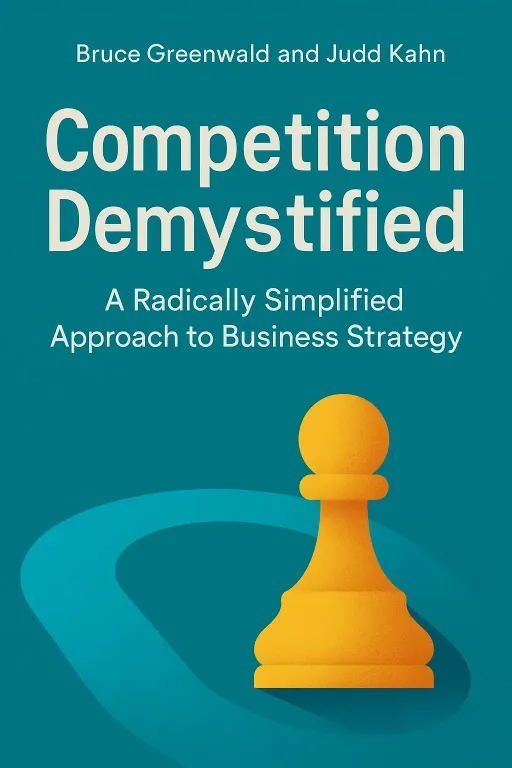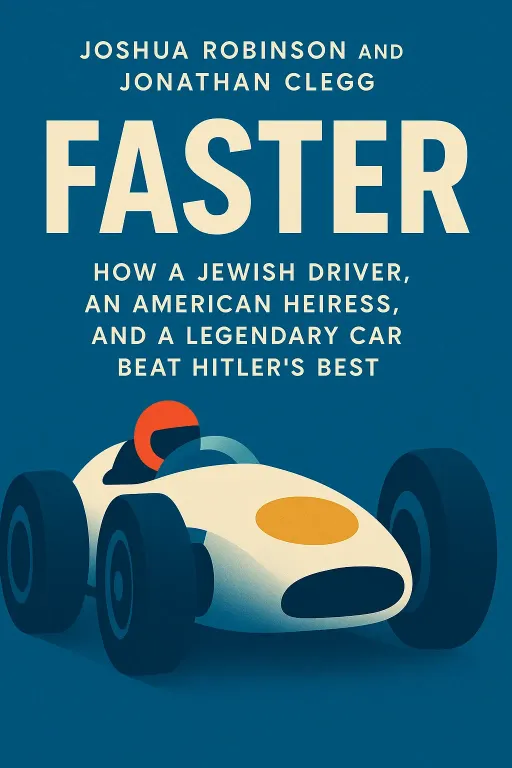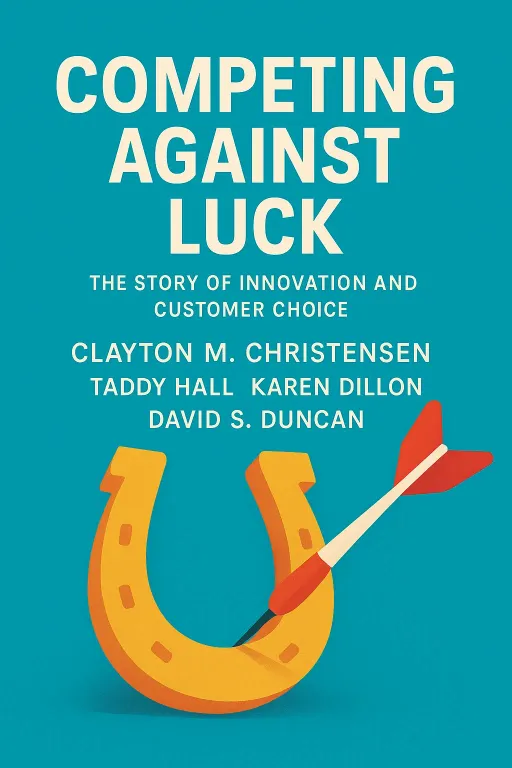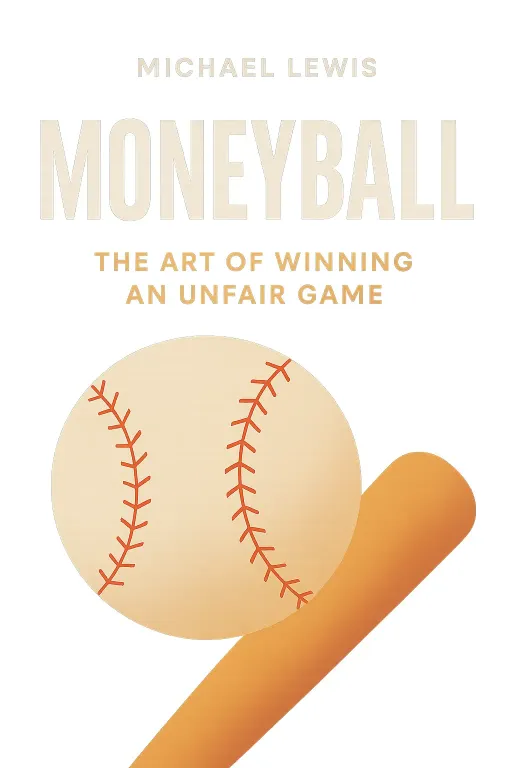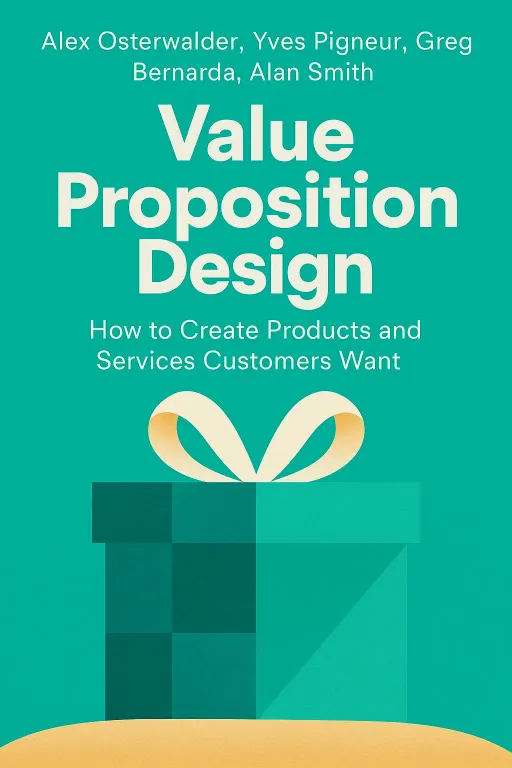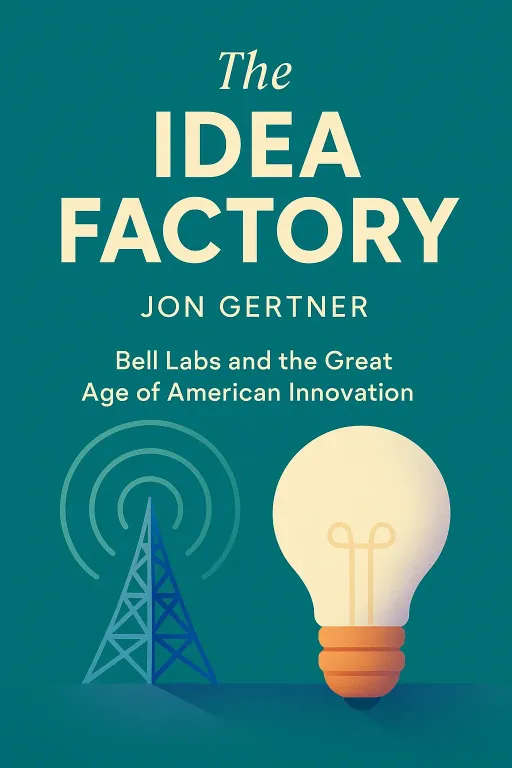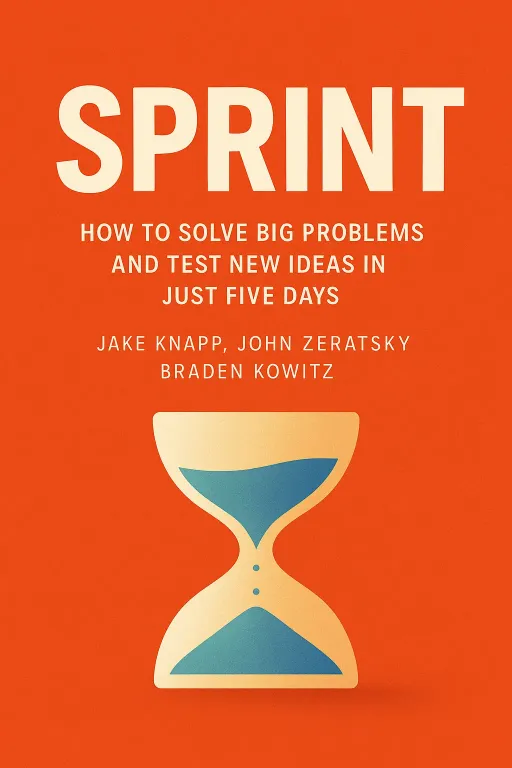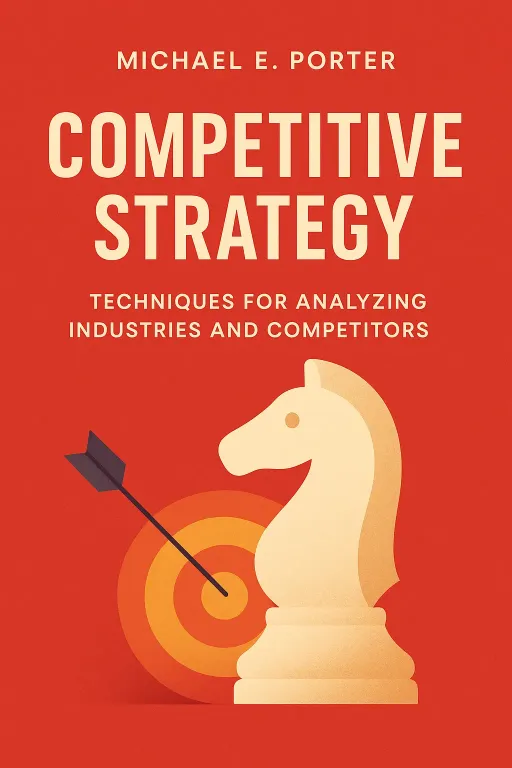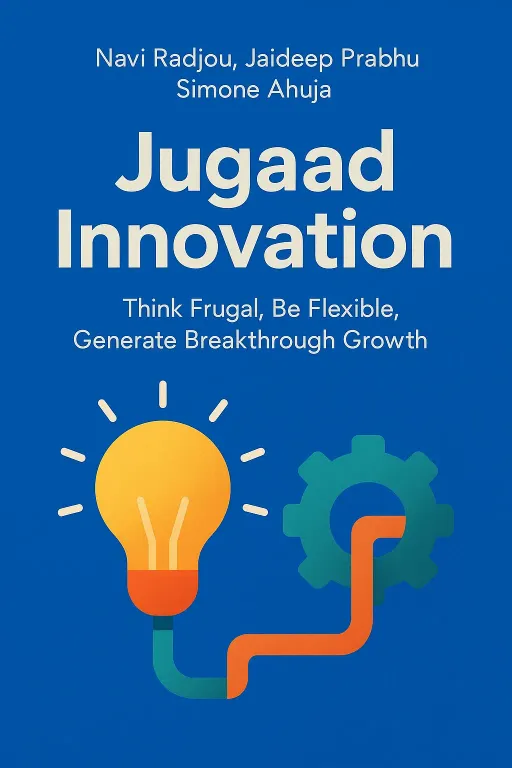
The Genius of Constraints
12 minThink Frugal, Be Flexible, Generate Breakthrough Growth
Golden Hook & Introduction
SECTION
Joe: Most companies think innovation comes from a huge R&D budget. They're wrong. The world's most groundbreaking ideas often come from having almost nothing at all. In fact, your biggest constraint might be your greatest asset. Lewis: That feels completely backward. You're telling me that to invent the next big thing, I should start by emptying my pockets and throwing out my plans? That sounds like a recipe for disaster, not a breakthrough. Joe: It sounds like it, but it’s the radical idea at the heart of Jugaad Innovation: Think Frugal, Be Flexible, Generate Breakthrough Growth by Navi Radjou, Jaideep Prabhu, and Simone Ahuja. Lewis: Right, and these aren't just random authors. We're talking about a team with deep ties to Cambridge Judge Business School and innovation consulting. They spent years researching this on the ground. This isn't just a philosophical hunch. Joe: Exactly. They saw this pattern of resourceful, improvised problem-solving not just in India, where the term 'Jugaad' comes from, but across emerging markets. They realized it was a blueprint for innovation that the West, with its rigid, expensive processes, was desperately missing. The Economist even called their book "the most comprehensive book yet to appear on the subject." Lewis: So it's more than just a buzzword. It's a system. Joe: It's a mindset. And to really get what 'Jugaad' means, we have to go to a small village in Gujarat, India, right after a devastating earthquake in 2001.
The Jugaad Mindset: Innovation from Scarcity
SECTION
Lewis: An earthquake. That’s a grim place to start looking for business lessons. Joe: It is, but it's the perfect place to find Jugaad. In the aftermath, a local potter named Mansukh Prajapati was reading the newspaper. He saw a photo of a traditional clay water pot, a matka, that had been smashed in the quake. The caption read: "Poor man’s fridge broken!" Lewis: Oh, that's heartbreaking. Just a simple, everyday object, but for someone, it was everything. Joe: Precisely. And for Prajapati, that caption wasn't just a sad line; it was a call to action. He thought, "Why can't I use my skills as a potter to create a real, affordable fridge for villagers who have no electricity?" He had no lab, no venture capital, no team of engineers. He just had clay, his hands, and this powerful sense of empathy. Lewis: So what did he do? Just try to make a bigger pot? Joe: He started experimenting. He tinkered with different clay mixtures and designs. After countless trials, he developed the "Mitticool," which translates to "cool with clay." It's a small, two-chambered refrigerator made entirely of clay. You pour water into a chamber on top, and as it evaporates through the porous clay, it cools the chamber below, keeping vegetables, milk, and water fresh for days. Lewis: Wow. No electricity, no moving parts. Just the natural process of evaporation. That's genius in its simplicity. Joe: It's pure Jugaad. He saw opportunity in adversity. He did more with less—literally just clay and water. And he kept it simple. The result was a product that cost about 50 dollars, was eco-friendly, and solved a massive problem for millions of people. He even created jobs by training local women to help mass-produce them. Lewis: That's an amazing story. But here's the question that pops into my head: is that 'innovation' in the same way we think of, say, the iPhone? Or is it just a clever, one-off invention? It feels different. Joe: It is different, and that's the whole point of the book. Western innovation is often seen as this top-down, structured, resource-intensive process. You need a state-of-the-art lab and a billion-dollar budget. Jugaad is the opposite. It's bottom-up, flexible, and frugal. It's a mindset. Lewis: A mindset of... what? Making do? Joe: A mindset of seeing constraints not as limitations, but as creative fuel. The authors argue that the West has actually lost this spirit. They point to figures like Benjamin Franklin, who invented bifocals and the Franklin stove not in a fancy lab, but by tinkering to solve everyday problems he saw around him. Or Cyrus McCormick, a farmer who invented the mechanical reaper in his family barn, revolutionizing agriculture. That was the original American Jugaad spirit. Lewis: So you're saying we used to have it, but we professionalized it away? We built these giant, rigid R&D departments and forgot how to just... solve a problem with what's in front of us. Joe: Exactly. We built orchestras, as one quote in the book puts it. Perfectly rehearsed, hierarchical, and playing from a set score. But Jugaad is a jazz band. It has a structure, but it thrives on improvisation, agility, and creativity. It's about responding to the moment. Lewis: A jazz band. I like that. It’s less about perfect execution of a plan and more about brilliant adaptation. Joe: And that's what makes it so powerful. Prajapati didn't have a five-year business plan. He had a problem he was passionate about solving, and he improvised his way to a solution. Lewis: Okay, I get the mindset. It’s a powerful idea. But how does it become a strategy? It can't just be 'hope for a disaster and get creative.' There have to be some underlying rules, right? Joe: There are. The book breaks it down into six core principles. And seeing them in action is where you realize this isn't just for small-scale potters. It's a strategy that can build empires.
The Six Principles in Action: From Adversity to Opportunity
SECTION
Lewis: Alright, give me the principles. How does this scale up from a clay fridge to something bigger? Joe: Let's start with the first and most important principle, which we've already touched on: Seek Opportunity in Adversity. To see this at a massive scale, we need to look at another Indian entrepreneur, Tulsi Tanti. In the late 1980s, he started a textile business. Lewis: Textiles. Okay, not exactly a high-tech industry. Joe: Not at all. And he immediately ran into a huge wall. The power supply in his region was a nightmare. It was unreliable and incredibly expensive, eating up almost half of his operating costs. His profit margins were razor-thin, around 5%. The unreliable power was slowly killing his business. Lewis: I can see how that's adversity. Most CEOs facing that problem would just lobby the government for better infrastructure or maybe move their factory to a different country. Joe: That's the typical, structured response. But Tanti, with a Jugaad mindset, didn't see a roadblock. He saw an opportunity. He thought, "This power problem is strangling not just my business, but every business in India. If I can solve this for myself, I can solve it for everyone." Lewis: That’s a huge mental leap. From "my factory has a problem" to "I'm going to solve India's energy crisis." Joe: It's a complete reframing of the problem. He started experimenting. He bought some generators, but they were dependent on expensive fuel. He needed a fuel-independent solution. So, in 1990, he took a huge risk and bought two wind turbines to power his textile unit. Lewis: Wind turbines? In 1990s India? That must have seemed insane. Joe: It was a massive gamble. But it worked. He suddenly had a reliable, sustainable, and cheaper source of power. And that's when the real lightbulb went off. He realized the textile business wasn't his future. The solution to his problem was his future. In 1995, he sold the textile business and founded Suzlon Energy. Lewis: No way. He just pivoted his entire career based on that one solution? Joe: He did. And today, Suzlon Energy is one of the world's largest wind energy companies, operating in dozens of countries. He turned a crippling obstacle into a multi-billion dollar global enterprise. That is seeking opportunity in adversity on a grand scale. Lewis: That's incredible. It connects to another principle, doesn't it? Think and Act Flexibly. He wasn't rigidly attached to his identity as a textile guy. He was a problem-solver, and he followed the solution. Joe: Exactly. And this is where it gets really interesting for Western companies. Many of them, like you said, have lost that flexibility. The book tells a fascinating story about 3M, the company famous for innovations like Post-it Notes and Scotch Tape. Lewis: The kings of accidental innovation. Their whole culture was built on letting engineers tinker, right? The famous "15% time" where they could work on whatever they wanted. Joe: Right. That was their Jugaad spirit. But in the early 2000s, they brought in a new CEO, Jim McNerney, who came from GE. He implemented the highly structured, data-driven Six Sigma process to streamline everything and cut costs. Lewis: I can see the logic. Make things more efficient, more predictable. Wall Street probably loved it. Joe: They did. Profits went up. But innovation plummeted. The "jazz band" culture was being forced to play like a perfectly tuned but soulless orchestra. One of their own executives later said, "when you value sameness more than you value creativity, you undermine the heart and soul of a company like 3M." Lewis: So what happened? Did they just become another boring, efficient conglomerate? Joe: No. The next CEO, George Buckley, recognized the problem. He famously said you can't schedule "three good ideas on Wednesday and two on Friday." He rolled back many of the rigid Six Sigma initiatives and brought back the 15% time. He reignited 3M's Jugaad spirit. He encouraged engineers to be flexible, to experiment, to fail. And the company's innovation engine roared back to life. Lewis: So even a massive Western corporation can rediscover this mindset. It's not just for entrepreneurs in emerging markets. It’s a universal principle for staying agile. Joe: It has to be. The world is becoming more complex and unpredictable for everyone. The book argues that scarcity—of resources, of time, of capital—is the new global norm. Western companies are facing the same kinds of constraints that Jugaad innovators have been dealing with for decades. Lewis: It's like the rest of the world is finally having to learn the lessons that people in places like India or Brazil or Kenya learned out of necessity. Joe: That's the core argument. The future of innovation isn't about having more; it's about doing more with what you have. It's about being resourceful, flexible, and simple. It's about including people on the margins, not just the wealthy center. And it's about following your heart—your passion and empathy—not just a spreadsheet.
Synthesis & Takeaways
SECTION
Lewis: Okay, so as we wrap this up, what's the big takeaway here? Should every company just throw out its business plan and start improvising? That still feels a little chaotic. Joe: It's not about chaos. It's about balance. The book uses that great analogy: Western companies have become orchestras—perfectly rehearsed, incredibly precise, but rigid. They play the music flawlessly, but they can't improvise when the environment changes. Lewis: And Jugaad is the jazz band. Joe: Exactly. A jazz band has a structure, a melody, a key. But it thrives on improvisation, on listening to each other, on responding in the moment. The biggest takeaway is that in a world of constant, unpredictable change, the ability to improvise isn't a weakness; it's a core competitive advantage. The future belongs to the jazz bands. Lewis: I love that. It reframes improvisation from a lack of planning to a high-level skill. So what's the practical step for someone listening? Whether they're a manager at a big company or just trying to solve a problem at home. Joe: The book gives a simple but powerful starting point. Ask yourself: 'What is my biggest constraint right now?' It could be a lack of money, time, or a specific skill. Lewis: And normally, we'd see that as a wall. A reason to stop. Joe: Right. But the Jugaad mindset flips that. Instead of seeing it as a wall, ask: 'How can I use this constraint as a tool? How can this limitation force me to think differently and find a more clever, more elegant solution?' Lewis: That's a powerful reframe. It makes you wonder, what problem are you avoiding because you think you don't have the resources, when in fact, the lack of resources is exactly what you need to find the real solution? It's a challenge to all of us to look at our problems sideways. Joe: It really is. It’s a call to find the opportunity hidden inside our own adversity. Lewis: A fantastic and deeply optimistic way to look at the world. It makes me want to go find a problem I thought was impossible and give it another look. Joe: This is Aibrary, signing off.
